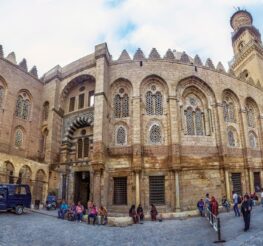Bill Gate’s Holiday Reads
A Thousand Brains Andy Weir Hamnet Jeff Hawkins Jennifer Doudna Kazuo Ishiguro Klara and the Sun Maggie O’Farrell Project Hail Mary The Code Breaker Walter Isaacson
Nada Medhat
It would be more than a stretch to imagine you’ll start thinking like Bill gates if you read the books he read, but that doesn’t mean it’s not worth checking what sort of books a man like him finds value in.
Near the end of every year, Bill Gates releases his yearly book recommendations, and this year’s list came just in time for some holiday reading, so strap up as we guide you through Bill Gates holiday reads.
A Thousand Brains: A New Theory of Intelligence, by Jeff Hawkins.

Among his other achievements, Jeff Hawkins is the founder of the Redwood Center for Theoretical Neuroscience where he leads a team in efforts to reverse-engineer the neocortex and enable machine intelligence technology based on brain theory. His book “A Thousand Brains” details the discoveries he has made with his team since then. More grounded than philosophical, Jeff Hawkins unveils what he learned on how the brain uses maplike structures to build a model of the world, hundreds of thousands of models of everything we know, and yet, he delves into what this means for how we perceive the world, how we perceive ourselves, and essentially, what this means for AI. Basically, Hawkins’ theory of the brain and its relation to Artificial Intelligence isn’t only revolutionary, but it might mean that our whole approach to AI has been missing essential factors, and if the theory is indeed correct, then it means a very different future for AI than what has previously imagined, either realistically or in dystopian narratives.
The Code Breaker: Jennifer Doudna, Gene Editing, and the Future of the Human Race, by Walter Isaacson.

The Noble Prize 2020 in Chemistry was awarded to Emmanuelle Charpentier and Jennifer Doudna “for the development of a method for genome editing.” What they discovered is basically one of the most ground-breaking biological advances in the last century; the CRISPR/Cas9 genetic scissors. Which gives the ability to change the DNA of animals, plants and microorganisms with extremely high precision. Isaacson delves into the researches and work that has gone into making this discovery, but the scope of the book is much, much bigger. It explores how exactly revolutionary that discovery this, but it also delves deeply into what it means for ethical science. When it comes to gene editing, especially hereditary genes that can pass down generations, and given humans’ collective history with misusing medicine, Isaacson asks the difficult questions and unveils the possible answers.
Klara and the Sun, by Kazuo Ishiguro

The Noble-award-winning novelist is no stranger to taking the most human approach possible to technology in his literature. Klara and the Sun is a story about a sick child and her artificial friend, taking place in a dystopian future. But like “Never Let me Go”, the book isn’t concerned with the technology that would get us there as much as what it means for human life, with no grim exaggeration of evil robots taking over humanity or anything of the like. It delves rather into the universal desire for companionship, and how that would affect our relationship with artificial machines.
Project Hail Mary, by Andy Weir

“The Martian” writer comes back with another fun science-fiction project. This time, the premise is about middle school teacher Ryland Grace, who wakes up from a coma afflicted with amnesia and finds himself with two corpses aboard a small spaceship. He gradually remembers that he was sent to the Tau Ceti solar system, 12 light-years from Earth, to find a means of reversing a solar dimming event that could cause the extinction of humanity. The novels cuts between flashbacks of everything that led him there and between the impossible task at hand.
Hamnet, by Maggie O’Farrell

The only book not scientifically oriented in any way or form on this list. The novel derives its title from Shakespeare’s son who died at the age of 11, and it aims to bridge and imagine the connections between this one tragic event of The Bard’s life and one of his grandest, most universally well-known plays, Hamlet. Essentially, it’s also a tale about a marriage that had borne through an unimaginable loss, and the traces this loss left on everything in the protagonists’ lives.
recommended
 Arts & Culture
Arts & Culture
The Coptic Museum: The History of Egypt to the Tunes of Psalms of David
arts & culture cairo museums +4 Health & Fitness
Health & Fitness
Egyptians in the 2024 Summer Olympics
Egyptians in the Olympics Olympics +1 City Life
City Life
Weekend Guide: Bazar by Sasson, Memo, The Cadillacs, Heya Bazaar, Dou, Nesma Herky & More
Concerts The Weekend Guide +2 Arts & Culture
Arts & Culture

